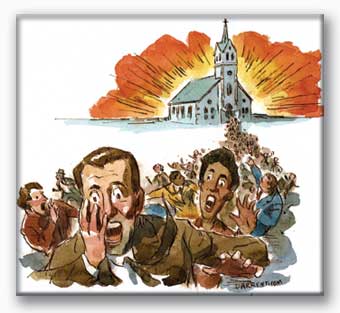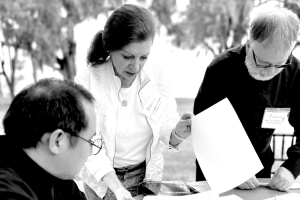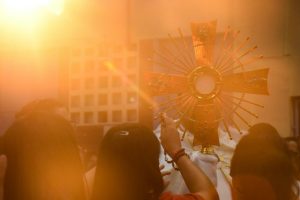Parishes can’t always anticipate impending disaster, but there’s plenty they can do to prepare and protect themselves from the worst.
That’s not all, folks. Before he was finished and whisked off to federal prison to think over his malfeasance for a few years, the purloining pastor racked up $140,000 in restaurant bills, which he called “job entitlement” in his testimony. (I want this guy’s job!) Furthermore, he spent $37,000 of the collection on furnishings for his digs, $51,000 flying his mother in for visits, and a whopping $515,000, most of which ended up in Father’s checking account, for “parishioners in need,” presumably to help the poor pewsters meet their yacht payments. All told, investigators uncovered $1.4 million in questionable expenditures. Can you believe a parish that wouldn’t even miss that much?
But wait, there’s still more. The parish bookkeeper, understandably suspicious of the leaky liquidity, allied with the parochial vicar and brought the issue to the diocese. The diocese initially put a lid on it (imagine that) and told the whistleblowers to lay off. Instead, the parish staffers hired a private eye to do the dirty work and uncovered the fleecing.
The diocese subsequently launched an investigation. In the aftermath the priest who brought the larceny to light ended up quitting, and the bookkeeper sued the diocese for harassment and threatening to take away her medical benefits. The diocese regrets the priest leaving and has denied the bookkeeper’s allegations.
Think this is out of the ordinary?
It is, gracias a Dios?.?.?.?sort of. But as Roseanne Roseannadanna used to say on Saturday Night Live, “Well, Jane, it’s always something. If it isn’t one thing, it’s another.” Because of the trusting nature of church organizations, a lack of professional management skills, and in some cases just plain incompetence, the table is set for disaster in many of our parishes.
Church leaders rarely have training in business administration. Hiring practices are often haphazard or based on the “she seems nice” principle. Fingerprinting and background checks may weed out sex offenders, but they won’t stop someone from making a really stupid decision that will put the parish in jeopardy. As a result, the list of bad things that continue to happen to good parishes is pretty long.
Lead us not into temptation
A report released in 2006 by the Center for the Study of Church Management at Villanova University found that 85 percent of Roman Catholic dioceses that responded to a survey had discovered embezzlement of church money during the previous five years. And last August the e-newsletter of the lay reform movement Voice of the Faithful reported that since January 2006 it had tracked 79 cases of embezzlement within Catholic parishes and institutions totaling more than $30 million.
That means your parish and mine could be next. Should we be ready for that? You bet. It’s just way too easy for a priest or bookkeeper with paws on the purse strings to tap it for personal gain, and, people being people, we’ll sometimes fall to the temptation.
I remember years ago, before my conscience was fully aware of my own inner pirate, an old parishioner with no family left a bequest to the parish for a few hundred thousand. Like a lot of pastors, I was loathe to give up the diocesan cut, so I simply opened several parish “rainy day” accounts in some local banks. I, of course, was the signatory, and nobody knew about it except the executor of the parishioner’s estate—and he was Jewish. I eventually repented, reported the accounts to the diocese, and paid the cathedraticum. But I could’ve just as easily pocketed the whole kit and caboodle and retired to Florida.
I doubt I’m the only priest who’s ever had that idea. But how do you head off buccaneering the books? Centralized financial management on the diocesan level would be a start. But in some cases that may be putting the foxes in charge of the henhouse.
What every parish can and should do is call in the parish finance council, put them to work reviewing the parish finances every month, and then publish a monthly report in the bulletin. Not that every pastor is in the kitchen with the books, but financial transparency is a major building block of parish trust. And these days our parishes could use a little trust.
The case of the disappearing parish
With the falloff in vocations, aging clergy, and the ones that leave—not to mention the handful that end up behind bars—there is an obvious and well-known shortage of priests available to staff parishes. Bishops have responded in various ways, one of which has been to close or merge parishes. Has this happened to your parish? It did to one parish I know of in California. Here’s how it was done.
The bishop’s representative came to Mass one Sunday and announced that (1) the parish would be merged with the parish in the next town; (2) the beloved pastor would be reassigned elsewhere and the newly merged parish would be administered by a layperson; and (3) the newly formed parish would be given the name of a saint nobody had ever heard of. All this, by the way, would happen in two weeks. Additionally, a new church facility would be planned and built, which of course meant that the old building, the one built by parishioners’ grandparents, in which many of the folks had been baptized, received First Communion, married, and were now gathering with their children, would be abandoned.
Two weeks? Holy cow! For the parishioners it was, of course, devastating. They collectively felt like they had been kicked in the stomach. Why wasn’t there any consultation? What had they done to deserve this? Why weren’t they told beforehand? What was going to happen to them without a priest? And who was going to pay for the new church? These were issues that the diocese should have addressed with the people before any concrete decisions were reached.
The outgoing pastor didn’t help any. Along with never talking to his parishioners about the inevitability of this happening to their vulnerable parish, he openly bad-mouthed the bishop’s decision, the incoming administrator, and the merging sister community that had long been the hated archrival to the town’s high school football team. What a nightmare!
The pastor should’ve seen this coming and helped his parish to prepare. I remember when I was pastor of a growing parish and someone asked me about the possibility of a second priest being assigned to help carry the load. I realized then that many of the parishioners didn’t have a clue about how the clergy shortage was going to affect parish staffing. So I began to speculate openly about the chance that the next pastor might be a regional pastor with responsibility for several parishes, or perhaps even a deacon, religious, or lay administrator.
As it turned out, the next pastor was indeed a part-time presence because he had a full-time position with the diocese. But by then the parish was ready, having a strong pastoral council, several active community ministries, and an understanding that this was the direction we were headed. Several years later I happened to encounter a former parishioner who thanked me for preparing them for what was coming.
Change we can believe in
The arrival of a new pastor can be quite upsetting for a parish. Years ago I was sent to help out in a parish where the pastor was dying. Eventually the old guy died and I was made the new pastor. The former pastor was a good man, God rest his soul, kind and caring, but he was what you would call “old school,” very old school, and he had been in place for 15 years. And before him there was a pastor who was even older school, and he had been there for 25 years. So we’re talking 40 years, a whole generation of old-school pastoring. Then I showed up.
Needless to say, some in the parish were grievously afflicted. There were Sundays when folks would walk out during Mass and drive to the church in the next town. But it so happened that the church in the next town had a new pastor, too, and he and I used to kid each other about Sunday morning traffic jams with people driving back and forth between our two churches.
Change is tough on people. We want things to remain the same, especially in church. Stability means security, and change challenges that security. But change also means new opportunities.
Often people who are close to a pastor and influential in a parish might lose their position when a new pastor shows up. At the same time, people dwelling on the edges of parish life for one reason or another might be encouraged by a new pastor to come forward and fill the void left by the old guard. Inner orbits move to the periphery and those on the margins move closer to the center. In many cases change provides the energy for renewal, and renewal is the way of all things.
Keep in mind, too, that a priest is also challenged by change. When a new priest arrives, he has just torn himself away from a community that has been his home for several years. He has left behind his own comfort and security, and the consolation of close friendships to enter into an experience of the unknown where strangers, sometimes hostile ones, await him. I remember how vulnerable I’ve felt in a new parish setting, missing my old buds and not quite ready for the task of forming new friendships. If a new priest seems a little standoffish, it’s sometimes because he’s also hurting and needs time to heal.
Then there is the situation when a new pastor has a hard time tearing himself away from his former parish. I remember being an assistant to a new pastor whom we called “Two-Way Tom,” and the road between his new parish and his old one became known as the Two-Way Tom Memorial Highway. He kept going back and forth for Baptisms, weddings, and funerals in his old parish. That, of course, made it hard on his new parish, but it also caused problems for the new pastor of his old parish.
This is why some dioceses make it a rule that a new pastor can’t return to his old parish for a number of years. A new pastor has to face the difficult task of leaving behind the old to make room in his life for the new. It is the way of death and resurrection, and it ain’t easy.
Dioceses would do well to establish transition programs for both pastors and parishioners. When a change in leadership is announced, a team could come to parish meetings and discuss these issues. Outgoing and incoming pastors could attend workshops addressing the experience and get needed help dealing with the change.
Attack of the architects
You want to get into some serious parish upheaval? Try remodeling the worship space. I mean, try changing anything in a church building. Like the pastor who was replacing a light bulb in the vestibule and a parishioner stormed in screaming, “What are you doing? That light was donated by my grandparents!”
But when it comes to church design and architecture, some guys get it and some guys don’t. Like the pastor who built a triangular church to represent the Trinity. I’m sure the Father, Son, and Holy Spirit liked it, but from the street it looked like a warehouse.
The worst remodel job I ever saw was done to the inside of a lovely old Gothic church by a kindly, well-meaning pastor and an interior decorator from Mars. And this was after the enormous hassle of raising more than a million dollars to finance the fiasco. It’s hard to describe the results, but it looked like a blend of Chinese pagoda and Turkish bazaar with a little George Jetson thrown in for effect.
The poor pastor got hammered from both sides. The parishioners were up in arms because it was their money, and the bishop was none too happy because it was his church. As I recall, it was shortly after that the bishop instituted an architectural review policy. Oh, and within a year the church burned to the ground. Investigators said the fire was of “suspicious origin,” but the perp was never found.
A competent diocesan architectural review board is not just a good idea, it ought to be a law. Priests afflicted with the dreaded edifice complex can too easily fall under the spell of brick-and-mortar hobgoblins that will drain parish coffers and build to your esthetical horror the Winchester Mystery House of Worship. But don’t take my word for it, take a gander at St. Mary’s Cathedral in San Francisco. Fabulous on the inside, but try to view the outside without thinking of a washing machine agitator.
Man with a plan
Someone once asked Robert Baden-Powell, the founder of the international Scouting Movement, what he meant by the Boy Scout motto, “Be prepared.” For what? “Why, for any old thing,” said Baden-Powell.
The best preparation I ever saw was by a parish located in one of those forest fire zones you read about every year. When a wildfire swept through recently, destroying dozens of homes in the town, the parish was ready to help. Not only did they open their parish facility to many refugees from the fire, but they sent a team of workers with food, water, blankets, and cots to the local evacuation center.
Even then they fell a little short. The local Mormon community was also on the scene with people and supplies to assist, but the Mormons were all decked out in bright yellow T-shirts emblazoned with the word Mormon. When the 6 o’clock news ran video of the relief effort, there were lots of Catholics from the parish in the picture, but you couldn’t tell by looking. All you could see were those yellow T-shirts declaring that Mormons were on the job. You can bet that by next fire season, the parish will have plenty of Catholic T-shirts on hand for their volunteers.
Our Lord promised that the gates of the netherworld would not prevail against the church. But he didn’t say there wouldn’t be times when you could hear those gates rattling. American Catholics are no strangers to trouble in their churches. Perhaps it is with renewed zeal that we pray “deliver us from evil” each day. With all the bad things that can happen to our good parishes, it’s certainly a prayer we need to take to heart.
This article appeared in the December 2008 issue of U.S. Catholic (Vol. 73, No. 12, pages 18-22).













Add comment